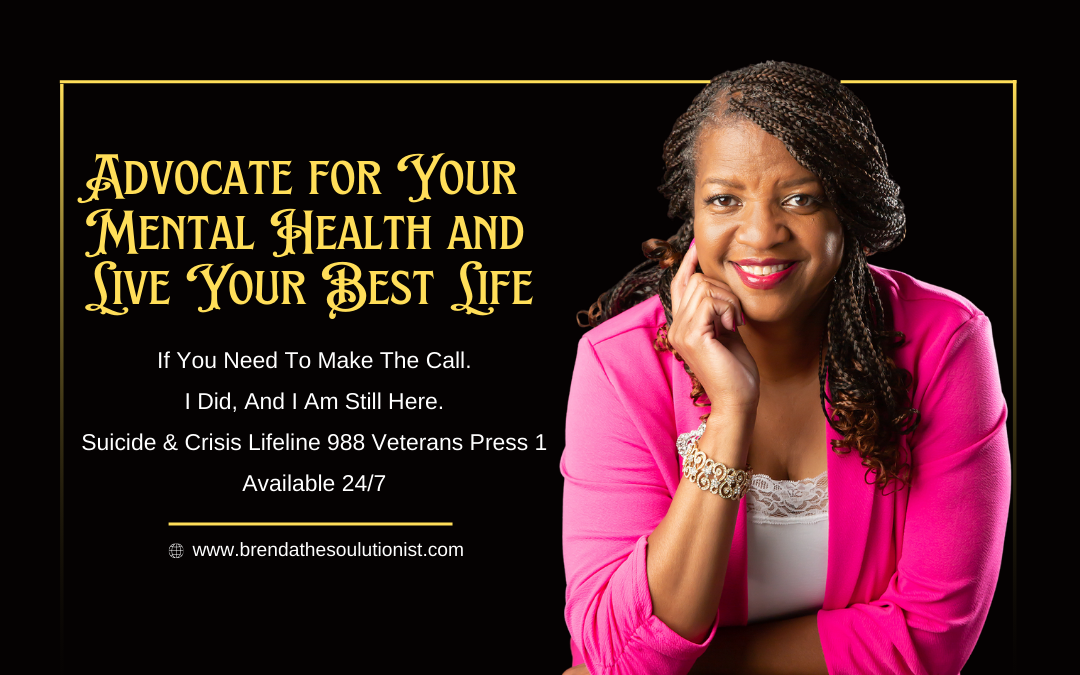
by Brenda The Soulutionist | Feb 12, 2024 | Mental Health
Yesterday, I was informed of the loss of another beautiful soul. This writing is my attempt to reach out in case someone else believes they are in a hopeless situation. As entrepreneurs, we all have days where we feel hopeless and discouraged. It could be a failed business venture, a lost client, the end of a relationship, or a rough patch in life that has left us feeling down and out. Some situations must run their course; at other times, plans must be made. Hopeless events do not exclude the possibility of better days ahead. The good news is that there are ways to navigate through these situations and come out on the other side stronger than ever before. In this article, I will share eight (8) strategies that have helped me through tough times, and I hope they will do the same for you.
Try these strategies when it appears all is lost:
1. Let it go. If the outcome is inevitable, does obsessing over it ever help? Letting go may seem like surrendering, but why persist with something unwinnable? Choose to release it and embrace the next chapter of your life. Letting go of beliefs, people places and things that no longer served me was one of the greatest gifts I gave myself.
2. Purge your emotions. Let your feelings out. There are healthy ways to uplift yourself. Some find solace in exercise, while others feel relief after a good cry. Spending time with loved ones or having dinner with friends may boost your spirits. I purge my emotions in a journal because a blank page holds no judgment. Sometimes I cried as I Journaled. The key is to seek a positive outlet. Reckless drinking, substance abuse, and impulsive spending are unhealthy choices. Choose wisely.
3. Try to learn something. In most cases, dire situations stem from past decisions. Reflect on your role in the current circumstances. Did you overlook warning signs in a relationship? Did you take on a mortgage beyond your means? Give yourself some grace and learn from your situation. I choose to look for the gift in every situation. It allows me to see any circumstances I encounter from a different perspective. It is common to repeat our mistakes. What can you learn to avoid a repeat performance in the future? Imagine how great your life would be if you only made each mistake once. Imagine what you would learn if you saw the gift in each situation.
4. Enjoy yourself. Now might be the perfect time to visit your favorite restaurant, take a walk in the park, or see a movie with a friend. Despite life’s challenges, you can still have a good time. Laugh and move forward. I look for joy in the small things. It gives me peace. I practice positive affirmations to increase my joy. My daily mantra is I bring joy, I am the peace. Try it or create your own. Because what you tell yourself matters.
5. Keep up with your responsibilities. Your children, family, and friends still need your love and attention. The bills still have to be paid. Avoid neglecting other areas of your life. When I found myself overwhelmed, I asked for help. I have discovered asking for assistance is not a weakness. It is a sign of strength. Sometimes, it was having responsibilities that kept me safe. Having a sense of purpose is essential, especially when you are in a perceived hopeless situation.
6. Create a plan for the future. Anticipating an interesting and exciting future can propel you forward. A bleak future makes it hard to be happy. Embrace the possibilities and craft an inspiring future for yourself. Then, take one small step towards making it a reality. Take time to write out your perfect day in great detail. Journaling is a great way to gather your thoughts and to write the story you want to live. I update my perfect day as needed to ensure I stay clear on what I desire for my life. Then I align my actions to ensure it comes to pass.
7. Make a list of all the things that fill you with gratitude. It is likely there are many people in the world with far more challenging circumstances. It can be easy to forget this fact. Reflect on what you have going for you and add to the list regularly. Refer to the list whenever you need a reminder that your life is worth living. Each morning when I rise, I think of ten things I can be grateful for to start my day positively. I have chosen to live with an attitude of gratitude, and it has made a world of difference in how I see my life.
8. Remember other situations in your life that seemed hopeless. Like me, you survived and ultimately came out more resilient and knowledgeable on the other side. Take time to recall past hopeless situations. If you are reading this, it means you survived. I pray you emerge stronger and wiser. As a woman of faith, I often rehearse God’s resume to remind myself that I am never alone, and this, too, shall pass.
Conclusion:
Hopeless situations are inevitable in life, but they don’t have to define us. Letting go and moving forward can be the best choice. Worrying has never altered the outcome of any situation. By implementing these eight (8) strategies, we can gracefully navigate challenging times and become stronger on the other side. Remember to take care of yourself, seek support from those around you, seek professional help when needed, and stay positive in the face of adversity. No opportunity is ever truly wasted when we learn from our experiences and use them as stepping stones towards success. If you or someone you know are thinking of harming themselves, please call the National Suicide & Crisis Lifeline at 988 Veterans Press 1. That line is available twenty-four hours a day. Be blessed and stay safe and remember that help is available. You are not alone.

by Brenda The Soulutionist | Jan 26, 2024 | Mental Health
Advocate for Your Mental Health and Live Your Best Life
Over the years, I have been blessed to speak to people worldwide with different business and career aspirations. One thing has been clear: as an entrepreneur, most of you are incredibly motivated to succeed personally and in business. I want to remind you that taking care of yourself is essential to living the best life possible. However, I am aware with the endless pressures of work and social media, it is too easy to overlook your mental health. In the past, I have neglected my own. I have even considered you may also feel like seeking help is a weakness that could hold you back. But nothing could be further from the truth. Advocating for your mental health is essential for living a fulfilling life devoid of anxiety and depression. In this blog, we will explore ways to prioritize your well-being, create a safety protocol for critical moments, and include a suicide prevention message to help yourself and others.
Prioritizing Your Mental Health
You must prioritize your mental health, just like you do your physical health. Self-care is a crucial element in preserving your emotional well-being. Take time out of each day for yourself; it could be meditating or taking a relaxing bath. Explore new hobbies or interests that could stimulate your mind and help you relieve stress. If you feel overwhelmed, take a step back and evaluate why. After a careful self-reflection, consider going to therapy.
Therapy is a proactive step for your mental health well-being management. Therapy does not necessarily mean that you have a problem; it merely indicates that you are taking care of yourself. ‘Talk’ therapies like Cognitive Behavioral Therapy (CBT) have been proven to work wonders for many people. CBT has been tremendously helpful in my journey to mental wellness. The truth is there are numerous therapies besides CBT. With the help of a professional counselor, you can discover a therapy plan that works for you. I encourage you to keep searching until you find the one suited to your unique needs.
Creating a Safety Protocol
People who suffer from depression or anxiety can have suicidal thoughts. It is essential to have an action plan in case of an emergency. If you ever have thoughts of self-harm, it is not a sign of weakness or failure. Your emotions and thoughts are not who you are or what you will become. Make a safety protocol to keep yourself secure during these moments.
Your safety plan should include several emergency contacts, such as your doctor, therapist, emergency services, and a trusted friend or family member, all with their contact numbers. Write down positive affirmations you can review during the crisis and activities you can do to motivate yourself to get through the tough times, like taking a walk in nature. Make sure these coping mechanisms work when you have suicidal thoughts, self-harm urges, or depression. To start, download a copy of the Mental Health Safety Protocol I created for myself when I developed my TAPIN Method. Use it as a reference to create your own.
Suicide Prevention Message
On the subject of self-harm, suicide remains one of the most critical issues facing the world today. If you suspect someone you know may be dealing with suicidal thoughts, encourage them to seek professional help immediately. Listen to them, ensure they feel heard, and never lecture or judge. The National Suicide Prevention Lifeline is there to assist anyone needing assistance at any time of the day or Night. Dial 988, Veterans, press 1, and get the support you need.
One of the best ways to help prevent suicide is by acknowledging your feelings openly and building a support system you can rely on. Speak with trusted friends or family members candidly about mental health to help yourself and others who may also be struggling. Please do not wait until you are in a crisis mood to have the conversation.
The Benefits of Being a Mental Health Advocate
It is important to recognize the benefits of advocating for mental health for yourself and others in both your daily life and business practices. By prioritizing and modeling good mental health, you show a positive example for others to follow. Cultivating healthy mentalities at work can boost productivity and morale significantly. To achieve fair workplace standards, we all must understand our roles to foster a safe environment for everyone. Simple things like being mindful that we are all unique individuals, using desired pronouns, and learning to agree to disagree without being disagreeable can go a long way to creating safe mental health environments for us all.
Conclusion:
In conclusion, the benefits of prioritizing and advocating for your mental health far outweigh any fears or doubts you may have. Do not be fooled by the life you see others leading on social media because, often, it is not authentic. Comparing your life to others is a way to feed the insecurities you do not want to foster. Embrace that you are unique and seek to develop your mind, body, and soul, emphasizing your mental well-being. Taking the time to advocate for your mental health is the first step in living your best life. You do not have to face these challenges alone; seeking professional help, creating a safety protocol, and including suicide prevention messages in your conversations can make all the difference. I pray this serves you as you strive to advocate for your mental well-being. Remember, each day is an opportunity, and it is up to you to seize it. Live your best life now – No Opportunity Wasted!

by Brenda The Soulutionist | Dec 3, 2023 | Mental Health
Today marks a special day as we celebrate the National Roof Over Your Head Day and the International Day of Persons with Disabilities. During this time, we reflect on our blessings and acknowledge the challenges we encountered. As an entrepreneur, I can’t help but think about the significant role these two celebrations play in my life. They inspire me to live my best life now and always remember that every day is an opportunity to make a difference.
Being Grateful
As I look back over my life, I cannot help but be grateful for my blessings today. I have a roof over my head and disabilities received during my time in the military that are not visible to the naked eye. I am humbled by the grace of God and the support of friends and loved ones who have helped me overcome challenges and become a better person. As I embrace gratitude on this particular day, I want to share how I maintain my sense of peace and positivity amidst life’s ups and downs. I hope this helps you as well.
Embrace A Positive Mindset
One of the keys to living your best life now is cultivating a positive mindset. Working on my mindset has been the key to me achieving my goals. Start your day with gratitude and set intentions that align with your goals. Instead of focusing on what you lack, focus on what you have and what you can achieve. Surround yourself with positivity and seek support from those who motivate and inspire you. My friend Lisa Ducharme, the 15 Minute Results Coach and AI Expert is one of the clear and positive voices I can count on. She and others in my life who challenge me are crucial to maintaining a positive mindset.
Have A Sense of Purpose
As an entrepreneur, having a sense of purpose and engaging in activities that bring meaning to your life is essential. Each day I rise, I look forward to seeing who I will be able to help that day. I am passionate about assisting others to close the gap between their desires and reality. Use your skills and talents to contribute to society and make a difference in the lives of others. Find a cause that aligns with your passions and positively impacts your community. Remember, even small acts of kindness can make a big difference.
Take Care of Your Physical And Mental Health
While pursuing my passion, I have not always done what was necessary to maintain harmony for my physical and mental health. I choose to put work ahead of health, which costs me significantly. Your health is your wealth. Do not go broke. I encourage you to prioritize taking care of your physical and mental health to live your best life. Exercise regularly, eat a healthy diet, and get enough sleep to recharge your batteries. Practice mindfulness and meditation to manage stress and improve your mental wellbeing. Seek professional help if needed, and make self-care a non-negotiable priority.
Connect With Others
Human connection is essential for our health and wellbeing. I have discovered a sure way to wreck my mental health is to isolate. Make time to connect with others and build strong, positive relationships. Surround yourself with people who uplift and support you, and be there for others in their times of need. Join groups and social communities like Convene Communities that share your interests and values and create opportunities for meaningful interactions.
Never Stop Learning and Growing
I am a lifelong learner. There is not a day that I do not learn something new; it allows me to continue growing. You may not be that extreme; however, to live your best life now, you must never stop learning and growing. Invest in your personal and professional development and adopt a growth mindset. Seek out new experiences and challenges that push you beyond your comfort zone and help you reach your full potential.
Take A Way
On this particular day, let us embrace gratitude and peace and celebrate the blessings in our lives. As entrepreneurs, let us remember that every day is an opportunity to make a difference and strive to live our best life now. We can overcome challenges and achieve our dreams by cultivating a positive mindset, having a sense of purpose, taking care of our physical and mental health, connecting with others, and never stopping learning and growing. Remember, no opportunity will be wasted when we embrace the power of gratitude and positivity to live our best life now. If you need help with your business, join me on Convene Communities for free. Convene is the platform with a purpose and the home of The Soulutionist Portal group coaching. Be Blessed.

by Brenda The Soulutionist | Nov 20, 2023 | Mental Health, Veterans
The holiday season can bring joy and happiness, but for individuals like me with Post-Traumatic Stress Disorder (PTSD), it can also be a time of increased stress and triggers. Having strategies for compassionate care for yourself and others can ease tensions that often occur during the holidays. I am not a doctor; you should seek a professional for medical and mental health advice. However, when family, friends, and co-workers educate themselves, they can become a fantastic support system and reduce holiday-related stress for those of us dealing with PTSD in addition to our professional support teams.
Taking time to understand the unique challenges faced by those with PTSD during this time is crucial. In this article, we will explore different factors I have experienced since my PTSD diagnosis and provide ten actionable and positive mental health tips to help individuals manage their stress levels effectively. I have used each of them occasionally to enjoy the holiday season with those I care about. Remember, you are not alone, and by taking proactive steps, you can navigate the holiday season with confidence and self-care if you keep an open mind and allow others to assist you as well.
1. Educate Yourself and Others: Learn about PTSD and its triggers. Understand that holiday-related stress may intensify symptoms and identify specific triggers that affect you personally. Please do not assume the people in your circle understand the effects of PTSD and how it affects you. Create learning opportunities before the holidays that will enhance your relationships and reduce everyone’s stress.
2. Seek Support: Ask for and seek support. It is a sign of strength. Connect with trusted friends, family members, or support groups who can offer understanding and empathy. I am a member of the I-Inspire House on Clubhouse, which meets every Sunday at 3:00 pm EST. I can share and learn from others in a safe environment. Sharing your experiences with others who have similar struggles can provide validation and comfort.
3. Set Boundaries: Prioritize your well-being by setting clear boundaries. Communicate your needs and limitations to loved ones, letting them know what you are comfortable with during social gatherings or events. Allow them to set boundaries as well. Everyone may not be prepared to provide the support you require.
4. Practice Self-Care: Incorporate self-care activities into your routine. Engage in activities that bring you joy and relaxation, such as reading, listening to music, taking walks in nature, or practicing mindfulness meditation.
5. Deep Breathing Exercises: When feeling overwhelmed, practice deep breathing exercises. Take slow, deep breaths in through your nose, hold for a few seconds, and then exhale slowly through your mouth. This technique can help calm your nervous system and reduce anxiety.
6. Avoid Triggers: Identify potential triggers and plan accordingly. If certain situations or environments exacerbate your symptoms, consider avoiding or modifying them to minimize stress when those around you know your triggers; they can be allies in helping you manage them.
7. Create a Professional Support Network: Reach out to mental health professionals experienced in working with PTSD patients. They can provide guidance on coping strategies and help develop a personalized plan to manage holiday-related stress.
8. Prioritize Sleep: Aim for consistent and quality sleep. Establish a relaxing bedtime routine, create a comfortable sleep environment, and avoid stimulants before bed. Sufficient rest can significantly impact your overall well-being and ability to manage stress.
9. Practice Mindfulness: Stay present in the moment and practice mindfulness techniques. Engage your senses, focus on your surroundings, and engage in activities that anchor you to the present, such as deep breathing or grounding exercises.
10. Maintain Healthy Habits: Focus on maintaining a balanced lifestyle. Incorporate regular physical exercise, eat nutritious meals, and avoid excessive alcohol or substance use, as they can worsen symptoms and disrupt sleep patterns.
Remember, healing takes time, and being kind to yourself and those wanting to support you is essential. Asking for help is not a weakness. Advocating for yourself is a sign of strength. Strategies for compassionate care may require additional support; consider contacting professional resources like therapists, helplines, or organizations specializing in PTSD. Help is available twenty-four hours a day. If at any time you feel like harming yourself, call the National Crisis Hotline at 988 – Veterans Press 1. You are not alone; there is hope for a brighter holiday season and future.




